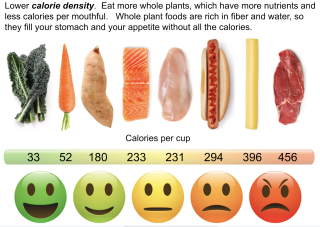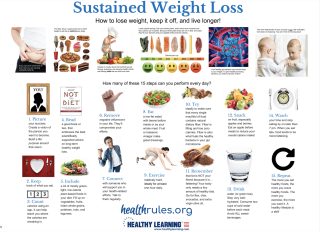The Checklist
If your goal is to lose weight and maintain a healthy weight...
- Picture your success. Create a viseion of the person you want to become. Build a life purpose around that vision.
- Weigh yourself twice daily.
- Count calories using an app. It teaches you where the calories are sneaking in.
- Read a good book or 2, that embraces the best science on long-term healthy weight loss.
- Eat a lot mostly green-light, low calorie plant based foods. Fill up on vegetables, fruits, intact whole grains, potatoes and legumes.
- Remove negative influencers. Get them on your team or out of your way!
- Connect with a supporter who will join you or who will take interest. Talk to them regularly.
- Salad. Eat a low-fat salad with beans before meals or as your whole meal. Fruit or balsamic vingear make great dressings.
- Exercise pretty hard almost every day. Get winded and feel the muscle burn! Ideally 1 hour per day.
- Fiber. Ideally every single mouthful contains natural dietary fiber. Fiber is filling, zero calorie, and fiber is what fuels the healthy bacteria in our gut microbiome.
- Low Fat. Fat is NOT your friend because it is fattening! Your body only needs a tiny amount of healthy fats. Go for glax, chia, avocados, EVOO.
- Fruit. Snacks=fruit, especially apples and berries., Eat and apple before meals to reduce overall calorie intake.
- Water (or green tea). Stay very well hydrated, 2 cups of cold water before each meal. Avoid ALL sweet beverages.
- Time restrict. Eat breakfast every morning and stop eating by 7pm. When you eat late, food is more fattening.
- Repeat. The more you eat healthy foods, the more you crave healthy foods. The more you exercise, the more you want it. Health is a skill!
The Science
It is super common to be overweight. If you can pinch about an inch of abdominal fat around your waist, you are probably carrying an unhealthy amount of visceral fat. Such abdominal fat can lead to more diseases and shorter lifespan.
It is uncommon for people to lose a lot of weight and keep it off. However, there are literally millions of scientific studies devoted to attaining a healthy weight. The problem may be that people are going about it the wrong way, and ignoring the science. Perhaps the most comprehensive recent review of the science of weight loss was published in 2019 by Dr. Michael Greger in his book How Not to Diet.
Beware of quick fixes to your diet such as pills, procedures, and low carb diets. Unless you change your lifelong relationship with food, you are unlikely to achieve weight loss and improved health. Low carb diets can cause rapid loss of water weight and muscle mass, and they tend to increase diseases and shorten lifespan. I assume that is not your goal. Bariatric surgery, when successful, can help a lot. But it carries significant risks and cost, and it does not necessarily address the underlying dietary habits.
Although people are very different from each other, our bodies are remarkably similar as to how we absorb nutrients and fuel our body. For the most part, a common set of overall principles apply to nearly everyone:
- Obesity is mostly a result of the foods we eat. We hold the power to reverse overweight and attain a healthy weight by changing what we choose to consume.
- We gain weight because we eat too many calories. We can lose weight by training ourselves to habitually consume lower calorie, healthier foods like vegetables, fruits, potatoes, intact whole grains, and legumes.
- Our bodies are designed to consume large amounts of plant food. Our cousins the great apes and our hunter gatherer ancestors typically eat 100 grams of fiber per day. Thee more fiber that modern human populations eat, the healthier they are.
- Fiber is especially helpful because it is zero calories yet filling. Fiber is THE fuel that feeds the healthy bacteria in our gut microbiota. If you want a healthy microbiota, that helps you attain a healthy weight, then you need to consume a diet as rich as possible in a diversity of whole plant foods containing their natural fiber. No surprise that research demonstrates that the more fiber people consume, the lower average body weight, and the less disease they have.

To achieve what so many fail at, to really conquer obesity for the rest of your life, you need to rethink your relationship with food. Many of the foods you have been trained to crave need to go by the wayside - eventually. Although our society (through advertising and social pressure) is set on tempting you with high calorie, low fiber foods like desserts, animal products, and processed foods, you will need to learn how to wall yourself off and develop new habits and tastes.
The main determinant of your success is you. I am not talking about your genetics or your biology. I am talking about your openness to learn new information and your willingness to work continuously on developing new tastes and skills. People who develop a sense of curiosity and flexibility and determination can pull off long term weight loss. If you do not have those things now, then by all means come back when you are ready. I will wait here.
Poster for this Checklist
(Click to purchase and download this poster.)

More Information
Print Checkist
Want a daily reminder of how to achieve these goals? Print out the checklist and put it on the fridge or give it to your physician and ask them for their support.
Health Poster
Are you a health care provider that would like to spread the messages of these checklists? Are you working through one of these checklists and would like a larger reminder? Join our health poster of the month club.
Give Feedback
Is this checklist missing something? Do you have a success story from trying this checklist out? We would like to hear any and all feedback.
Support Us
We are a small organization that hopes to help people take control of thier health. Our work would not be possible without your help.
Real Stories
Have a story?
Have you experienced your own journey to better health? Have our checklists been a helpful guide? Do you have a friend of family member that has been affected by a medical condition?
Take control of your health, one checklist at a time.
Sign up for our monthly poster club or newsletter.
References
Catenacci VA, Odgen L, Phelan S, et al. Dietary habits and weight maintenance success in high versus low exercisers in the National Weight Control Registry. J Phys Act Health. 2014;11(8):1540-1548. doi:10.1123/jpah.2012-0250
Fardet A, Boirie Y. Associations between food and beverage groups and major diet-related chronic diseases: an exhaustive review of pooled/meta-analyses and systematic reviews. Nutr Rev. 2014;72(12):741-762. doi:10.1111/nure.12153
Soini S, Mustajoki P, Eriksson JG. Weight loss methods and changes in eating habits among successful weight losers. Ann Med. 2016;48(1-2):76-82. doi:10.3109/07853890.2015.1136428
Karfopoulou E, Brikou D, Mamalaki E, et al. Dietary patterns in weight loss maintenance: results from the MedWeight study. Eur J Nutr. 2017;56(3):991-1002. doi:10.1007/s00394-015-1147-z
Wing RR, Phelan S. Long-term weight loss maintenance. Am J Clin Nutr. 2005;82(1 Suppl):222S-225S. doi:10.1093/ajcn/82.1.222S


